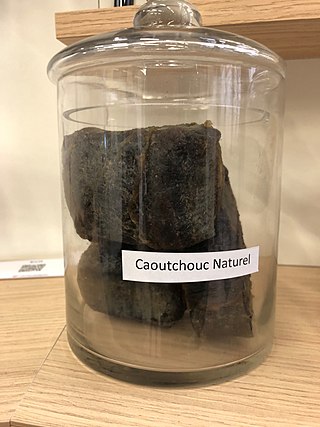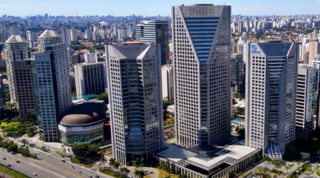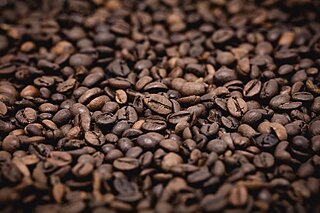
The economy of Indonesia is one of the emerging market economies in the world and the largest in Southeast Asia. As an upper-middle income country and member of the G20, Indonesia is classified as a newly industrialized country. Estimated at over 21 quadrillion rupiah in 2023, it is the 16th largest economy in the world by nominal GDP and the 7th largest in terms of GDP (PPP). Indonesia's internet economy reach US$77 billion in 2022, and is expected to cross the US$130 billion mark by 2025. Indonesia depends on the domestic market and government budget spending and its ownership of state-owned enterprises. The administration of prices of a range of basic goods also plays a significant role in Indonesia's market economy. However, since the 1990s, the majority of the economy has been controlled by individual Indonesians and foreign companies.

The economy of Malaysia is the fifth largest in Southeast Asia and the 36th largest in the world in terms of GDP. The 2018 labour productivity of Malaysia was measured at Int$55,360 per worker, the third highest in ASEAN. The 2021 Global Competitiveness Report ranked Malaysian economy the 25th most competitive country economy in the world.

Rubber, also called India rubber, latex, Amazonian rubber, caucho, or caoutchouc, as initially produced, consists of polymers of the organic compound isoprene, with minor impurities of other organic compounds. Thailand, Malaysia, Indonesia, and Cambodia are four of the leading rubber producers.

The economy of South America comprises approximately 434 million people living in twelve nations and three territories. It encompasses 6 percent of the world's population.

Agriculture in Thailand is highly competitive, diversified and specialized and its exports are very successful internationally. Rice is the country's most important crop, with some 60 percent of Thailand's 13 million farmers growing it on almost half of Thailand's cultivated land. Thailand is a major exporter in the world rice market. Rice exports in 2014 amounted to 1.3 percent of GDP. Agricultural production as a whole accounts for an estimated 9–10.5 percent of Thai GDP. Forty percent of the population work in agriculture-related jobs. The farmland they work was valued at US$2,945/rai in 2013. Most Thai farmers own fewer than eight ha (50 rai) of land.

Agriculture is a sector of the Nigerian economy, accounting for up to 35% of total employment in 2020. According to the FAO, agriculture remains the foundation of the Nigerian economy, providing livelihoods for most Nigerians and generating millions of jobs. Along with crude oil, Nigeria relies on the agricultural products it exports to generate most of its national revenue. The agricultural sector in Nigeria comprises four sub-sectors: crop production, livestock, forestry, and fishing.

Coffee is a popular beverage and an important commodity. Tens of millions of small producers in developing countries make their living growing coffee. Over 2.25 billion cups of coffee are consumed in the world daily. Over 90 percent of coffee production takes place in developing countries — mainly South America — while consumption happens primarily in industrialized economies. There are 25 million small producers who rely on coffee for a living worldwide. In Brazil, where almost a third of the world's coffee is produced, over five million people are employed in the cultivation and harvesting of over three billion coffee plants; it is a more labor-intensive culture than alternative cultures of the same regions, such as sugar cane or cattle, as its cultivation is not automated, requiring frequent human attention.

Top Glove Corporation Berhad is a Malaysian rubber glove manufacturer who also specialises in face masks, dental dams, and other products. The company owns and operates 50 manufacturing facilities in Malaysia, Thailand, China, and Vietnam. They also have marketing offices in these countries as well as the United States, Germany and Brazil.

Agriculture in Indonesia is one of the key sectors within the Indonesian economy. In the last 50 years, the sector's share in national gross domestic product has decreased considerably, due to the rise of industrialisation and service sector. Nevertheless, for the majority of Indonesian households, farming and plantation remains as a vital income generator. In 2013, the agricultural sector contributed 14.43% to national GDP, a slight decline from 2003's contribution which was 15.19%. In 2012, the agricultural sector provides jobs to approximately 49 million Indonesians, representing 41% of the country's total labor force.

The economy of Ivory Coast is stable and currently growing, in the aftermath of political instability in recent decades. The Ivory Coast's economy is largely market-based and depends heavily on the agricultural sector. Almost 70% of the Ivorian people are engaged in some form of agricultural activity. GDP per capita grew 82% in the 1960s, reaching a peak growth of 360% in the 1970s, but this proved unsustainable and it shrank by 28% in the 1980s and a further 22% in the 1990s. This decline, coupled with high population growth, resulted in a steady fall in living standards. The Gross national product per capita, now rising again, was about US$727 in 1996. It was substantially higher two decades before.

Agriculture in the Democratic Republic of the Congo is an industry in the country of the Democratic Republic of the Congo that has plenty of potential.
Palm oil, produced from the oil palm, is a basic source of income for many farmers in South East Asia, Central and West Africa, and Central America. It is locally used as cooking oil, exported for use in much commercial food and personal care products and is converted into biofuel. It produces up to 10 times more oil per unit area than soybeans, rapeseed or sunflowers.
The tapioca industry of Thailand plays an important role in the agricultural economy of Thailand. Tapioca is dried cassava in powder or pearly form. Tapioca, besides being used as a food, the "native starch" it provides is used as a thickening agent and a stabilizer in many products. Native starch is a powder obtained from plants containing starch. Native starch is extracted from the root of the cassava plant, which has the ability to grow in dry weather and low-nutrient soils where other crops do not grow well. Cassava roots can be stored in the ground for up to 24 months, and for some varieties for up to 36 months, thus harvest may be extended until market conditions are favourable or starch production capacity is available.

Kuala Lumpur Kepong Berhad (KLK) is a Malaysian multi-national company. The core business of the group is plantation. The company has plantations that cover more than 250,000 hectares in Malaysia and Indonesia. Since the 1990s, the company has diversified its business activities such as resource-based manufacturing, property development and retailing with worldwide presence. The company is listed on the Bursa Malaysia and is Malaysia's third-largest palm oil producer. KLK was ranked 1858th in the 2013 Forbes Global 2000 Leading Companies, with market cap of USD 6.91 billion. In 2014, KLK was ranked 23rd most valuable Malaysia brand on the Malaysia 100 2014 with a brand value of USD 364 million. The late Thong Yaw Hong, (former) secretary general of the Malaysian Treasury, sat on the board of KLK. Lee Oi Hian, the CEO of KLK, is or was chairman of the board of trustees of the Malaysian Palm Oil Council.

Iran is an energy superpower and the petroleum industry in Iran plays an important part in it. In 2004, Iran produced 5.1 percent of the world's total crude oil, which generated revenues of US$25 billion to US$30 billion and was the country's primary source of foreign currency. At 2006 levels of production, oil proceeds represented about 18.7% of gross domestic product (GDP). However, the importance of the hydrocarbon sector to Iran's economy has been far greater. The oil and gas industry has been the engine of economic growth, directly affecting public development projects, the government's annual budget, and most foreign exchange sources.

Agriculture in Malaysia makes up twelve percent of the nation's GDP. Sixteen percent of the population of Malaysia is employed through some sort of agriculture. Large-scale plantations were established by the British. These plantations opened opportunity for new crops such as rubber (1876), palm oil (1917), and cocoa (1950). A number of crops are grown for domestic purpose such as bananas, coconuts, durian, pineapples, rice and rambutan.
Kossan Rubber Industries is a Kuala Lumpur based public limited company engaged in manufacture, sale, and export of rubber products. It was founded by Tan Sri Dato’ Lim Kuang Sia in 1979. KOSSAN has to-date an annual gloves production capacity of 32 billion pieces and a compounding capacity of technical rubber products exceeding 10,000 metric tonne per annum.

Rubber production in Sri Lanka commenced in 1876, with the planting of 1,919 rubber seedlings at the Henarathgoda Botanical Gardens in Gampaha. The total extent under rubber in 1890 was around 50 ha and in the early 1900s it increased to around 10,000 ha. By 1982 the total extent under rubber was around 180,000 ha and the total annual production was 125,000,000 kg (276,000,000 lb). However, the total extent under rubber declined subsequently and at present it is around 120,000 h (430,000 ks)a. Rubber contributes about 0.6% of the total GDP. According to figures published in 2018 by the Rubber Research Institute of Sri Lanka, producing 82,600,000 kg (182,100,000 lb) in 2018.

The economy of Sarawak is the fourth-largest of the states of Malaysia, making up 9.3% of the Malaysian gross domestic product (GDP) in 2022. Meanwhile, Sarawak is home to 7.9% of the Malaysian population based on the 2020 census.

Dipped Products PLC is a rubber glove manufacturer in Sri Lanka. The company also manages rubber and tea plantations. The company was incorporated in 1976 and listed on the Colombo Stock Exchange in 1983. The company is one of the components of the S&P Sri Lanka 20 Index. Sri Lankan conglomerate, Hayleys is the effective controlling shareholder of Dipped Products. The company was ranked 26th in LMD 100, an annual list of quoted companies in Sri Lanka by revenue.

















